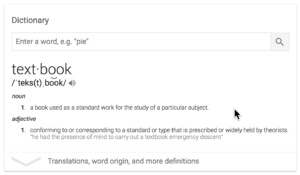So many times I’ve heard different doctors at different times tell me I am not “textbook” after many fails with medications and treatments. We were both frustrated, to say the least. I was tired of hearing it from doctors I trusted with my care (I’d later find out that treating a rare disease really is difficult to diagnose). So what does that mean really?
Let’s get the dictionary definition of “Textbook.” If you type in “textbook definition” into Google Search, you will learn the adjective definition of “Textbook” means:
conforming to or corresponding to a standard or type that is prescribed or widely held by theorists.
One of my doctors a couple years ago told me I wasn’t a “textbook” patient and that I would have a difficult time finding help and successful treatment. Ok, nothing new. I already knew that, already heard that, of course, AND I lived it. Then he went onto the “why” of it all. He explained that I was a “square peg in a round hole.” Dictionary.com describes this saying as, “A misfit, especially a person unsuited for a position or activity.” I laughed when I read this just now! I’m a misfit you say?! I’m unsuited! Wow. Well, it’s not me, it’s THEM! Ha! When my doctor explained it this way, I had a lightbulb moment and I stopped “hating” (not really hate, that’s such a strong word) my doctors who didn’t believe me. After all, I didn’t fit all the checkboxes on the “Hemiplegic Migraine” checklist. Guess what? I didn’t just have Hemiplegic Migraine. So this made diagnosis a nightmare.
I know my chronic pain disease is rare. I know when I tell people it’s a type of migraine, they look at me like, “no way!” Then they start to down play their own migraine disease, should they have it. [Side Note: if you have migraine disease, PLEASE do not feel like mine is worse than yours and start to downplay your pain. It’s your pain, you feel it, I don’t. Please do not put your pain second to someone who might have symptoms different than yours. Because that’s exactly what it is, different.] Hemiplegic Migraine (HM) is a rare type of migraine that mimics stroke and epilepsy. Some HM patients do have epilepsy and other comorbid diseases, making diagnosis difficult.

Have you been told you are not the “textbook” patient and there’s nothing more they can do for you? Have they said to you, “it’s possible your pain is only psychological and you should see a clinical psychologist,” only to upset you and make your illness feel invalidated? I was told those things, by several doctors over the last 14 years. Just those words alone put me into depression. Some even invalidated my Hemiplegic Migraine diagnosis and told me there was no way that’s what was wrong with me for the sole reason that it was too rare. Again, square peg, round hole.
I have some advice for you. Go see a clinical psychologist, therapist, counselor, or religious leader. Listen to your doctor, but not for the reasons they believe you should go if they feel you don’t have anything other than stress related pain. Do it because your life is important. It’s important to everyone you’ve ever met and everyone you’ll meet in the future. Living with pain is depressing. Depression can trigger pain. Then you find yourself in a cycle that is so difficult to get out of without outside help. Find the right therapist that is right for you. I went through several until I found one that “got me.” It takes time sometimes. I hope you’re that person who finds the perfect fit the first time. Don’t be me, though. Be better than me. Give each one a chance. I didn’t, if I didn’t like you the first appointment, I was done for weeks without talking to anyone. No outlet. I was frustrated and upset.
The day I found “the one” I knew right away. It wasn’t dumb luck, though. I had done research on therapists. I wanted one that wasn’t religious, was very clinical, had good ratings, and was part of a larger outpatient mental health clinic. I knew what I needed. Some people would rather have someone tied to their church or need a spiritual counselor. Start with your church or a religious-based center. I did research because I was ready. I felt so stupid for waisting so much time not listening to my doctor’s suggestion at talking to a therapist. I knew they were wrong with their “why,” my body and my mind told me so. I knew my pain was not 100% psychological. But if it was, no matter how much I “knew it,” I would work through that with my therapist.

The first clinical psychologist I saw gave me a couple months of visits before she told me her thoughts on my medical condition. In past posts, I’ve talked about this. She told me that I was not psychosomatic and that I needed to get another opinion for my illness. She suggested I go to a larger clinic that specializes in migraine. I’m sure I had a smug smile on my face that day…heck probably for days! I believed her, because I know my body better than anyone ever could. I couldn’t stay with her, unfortunately. My family and I moved, but I have a great therapist again.
Now please understand, I’m not saying that our thoughts or stress cannot cause pain. It really can, AS WELL AS exacerbate pain associated with diseases and illnesses. In case you’re wondering, psychosomatic means “(of a physical illness or other condition) caused or aggravated by a mental factor such as internal conflict or stress” as defined on Google Search. I have since learned I have a psychosomatic element to my triggers, as stress is a trigger for me. But my disease itself is not psychosomatic. I have migraine disease with several sub-types. I have degenerative disc disease. I have osteopenia. I have patent foramen ovale. I have diabetes type 2. I have non-epileptic seizures due to severe migraine pain. There’s more, but you get the idea. A lot of these diagnosis’ have imaging and testing results to prove them. While my migraine disease does not, I know that I can at least help one trigger, stress, through working with my therapist. Stress is a major trigger for me. Chronic stress would be a trigger for pretty much anyone with pain syndrome or disease with pain. See a therapist if you can, you will learn to look at things for a whole different and clearer perspective.
I moved too far from the headache clinic I normally go to. I know there’s a Mayo Clinic in Florida, about 5.5 hours from Fayetteville, NC where I live. But before I take that drive every few months, I’ve been referred to the University of North Carolina’s Headache Clinic. It’s about 1 hr 45 min drive. I’ve heard good things, so keeping my fingers crossed I won’t have to make that drive to Florida (thought I wouldn’t mind the scenery!). I don’t have an appointment yet, but I’m sure you can guess why I was given that referral by my local neurologist. Here’s a hint… square peg.
I’m okay being a square in this round world. I’m not alone.

Older Posts
Roller Coaster Ride of Life with Chronic Hemiplegic Migraine
Just because it’s rare doesn’t mean it isn’t real






Leave a Reply